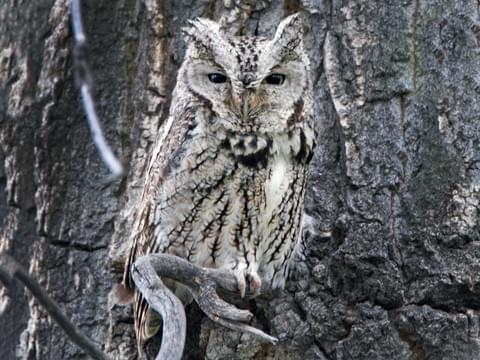When Londoners have a rodent problem, ‘hoot’ are they going to call? Local conservation groups are suggesting the use of owls instead of poison with the launch of a new pilot project.

The Responsible Pest Management Pilot Program in London, Ont., is looking at exploring environmentally friendly solutions to pest control with the installation of owl boxes around participating residences and businesses to house Eastern screech owls that will hunt rodents.
The project was created in a partnership between three organizations: Ontario Wildlife Removal Inc., Bird Friendly London and Green Economy London.
“Responsible pest management is something that we’ve been practising as a company for years,” said Jared Houliston, president of Ontario Wildlife Removal. “We don’t use rodenticides or poisons or anything of that nature because we see the contamination that’s happening to other wildlife. People poisoning rats and mice thinking they’re solving the problem are actually poisoning other wildlife that eat these animals, which then causes a detrimental effect.”

According to Green Economy London, local animal rehabilitation centres, such as the Salthaven Wildlife Rehabilitation and Education Centre, treat “many animals that suffer from secondary rodenticide poisoning,” saying their patients “represent just a tiny fraction of wildlife being affected in our region.”

Get breaking National news
Additionally, the group stressed that if used alone, “rodenticides offer limited protection against future infestations.”
“Rodents can multiply very quickly and if they are able to enter a building and find food, they will keep coming back and replacing others killed by poison,” the organization explained in a statement. “It is important to address the causes of rodents entering buildings in the first place.”
Houliston agreed, adding that “with this pilot project, we’re promoting the fact that that we can solve a lot of the problems without these rodenticides or poisons by securing and fixing the house.”
According to Houliston, the pilot project will help participants in London access solutions such as identifying and sealing rodent points of entry into buildings and applying rodent deterrents.
Participating businesses will also receive an owl nest box to place outside and use as a natural pest control solution. Additional nest boxes will then be made available for purchase to participating homeowners as well as the general public.
“This is more about controlling the (rodent) population,” he told Global News. “We’re working hand in hand with fixing rodent problems but doing owl conservation as well.”
He adds that even in urban environments, Eastern screech owls are very common in the region.
“It’s probably one of the most popular owls that are around,” Houliston said. “These little screech owls are small and can manipulate their flight path through houses and residential areas at night to get these little animals.”
Houliston, who has Eastern screech owl on his own property, added that the project can also be an educational tool.
“To learn their behaviour and watch them in your backyard is also an amazing experience.”
With the pilot project expected to run until January 2024, five residents and businesses will be selected from a list of applicants.
Applications are being accepted until Aug. 31.
According to the pilot project requirements, residents or managers of buildings that have had pest rodent issues in the past will be eligible to participate, encouraging applications from low-income households and small businesses.
More information about the Responsible Pest Management Pilot Program can be found on the Green Economy London website.
- ‘Something just went off’: Canadians in Middle East describe ‘surreal’ Iran missile strikes
- ‘At first I cried’: How Iranian Canadians are reacting to the U.S. strikes in Iran
- Khamenei’s death met with ‘jubilation’ among Iranian-Canadians: Liberal MP
- Iran begins search for new leader; U.S. military says 3 service members killed












Comments
Want to discuss? Please read our Commenting Policy first.